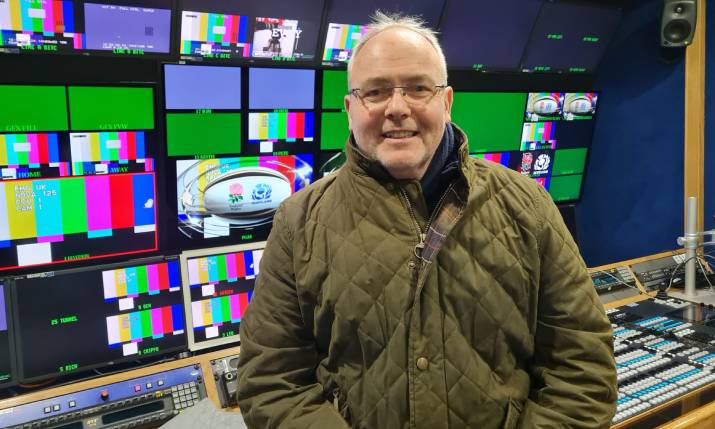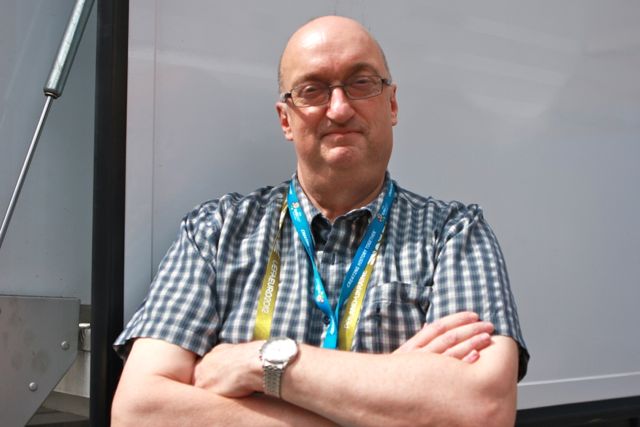Tech Insight: Tony Cahalane on taking ITV Sport forward as its new technical director

Chief technical officer at ITV Sport, Tony Cahalane, in an EMG truck in the TV compound at Twickenham Stadium just days before the Six Nations 2023 kicked off
Tony Cahalane recently stepped into the role of technical director at ITV Sport following the unexpected passing of former technical director, Roger Pearce, late last year at the FIFA World Cup in Qatar.
Cahalane had worked with Pearce for just a few short weeks in the run up to Qatar, but had worked with him on and off over 25 years, knew and admired him, and had seen what he had done for ITV Sport.
He comments on what it was like to work with Pearce: “Roger was completely unassuming, understated and generally it was like having a wise uncle to call upon and look up too! He was a peace maker and a subtle influencer, but there are many times when you look back and regard his technical bravery in pushing new fundamental workflows on large events as maverick!
“The one underlaying feeling you’d get working with Roger was a sense of a professional family… he liked everyone, and kept everybody in contact, happy and informed! Simply put, he was a lovable guy and had a great influence on many.”
“Technology needs to make a contribution to the output that’s genuinely seen. Picking through the semi developed, of little benefit and the semi developed with great potential is a constant challenge”
Pearce has left a lasting legacy of a technical community at ITV Sport, Cahalane says: “I think the spirit of a technical family that he perpetuated for lots of us is what Roger leaves as his legacy. I believe he saw the technical side of the industry as a large group who could feed and share with each other to grow knowledge and help the development in good and needed technology, and he continuingly delivered to the highest of standards by harnessing and steering great and talented groups of people.
“It’s daunting to try and tread in his footsteps!”

ITV Sport’s Roger Pearce
Embracing the new role
The short time spent with Pearce has left Cahalane with several challenges. He explains: “The little time I had with Roger has meant that I am sifting through the structure of ITV and some of the decisions and relationships that existed, and having to build my own understanding quickly. It could also be considered a benefit, as I often advise my children, to never underestimate what you can learn from others and always ask questions! Fortunately, there is no shortage of people that Roger kept close to whom I can ask questions and confess to!”
He goes on: “Technology needs to make a contribution to the output that’s genuinely seen. Picking through the semi developed, of little benefit and the semi developed with great potential is a constant challenge, especially while avoiding quashing well placed enthusiasm from production teams.”
Yet on what he loves about his new job, Cahalane states: “The opportunity to be involved in the technical architecture from the beginning of a project, from budget input to hands on delivery, is brilliant. The busy nature of ITV Sport’s output and the chance to influence some of the future development in sports technology through that volume, and above all I believe in the production teams and see a lot of continuing potential to impress a large audience.
“With all the tech in the world, it’s only worth the effort if you see it being used on screen and raise the odd goose bump or two.”
Cahalane has significant plans for the broadcaster going forwards. He explains: “I’d like to think that I can encourage a greater flow of information and collaboration that the industry is begging for, to the benefit of ITV Sport, our production teams and our suppliers. I’d also like to deliver on some of the desires of a blossoming production team as well as the ever-consistent talent base in ITV Sport, in terms of can we look at things differently, rewrite the some of the rules, maintain quality and resilience, but put more on screen?
“I also think we should have a greater influence on training, through support across the industry and valued facilities providers. This will only benefit ITV Sport as well as our broadcaster colleagues.”
“There is good technology, there is emerging technology, and there is bad technology, but with a level of experience we can assess quickly what is worth pursuing, what supports and grows what’s on screen, and what maintains the best of our heralded industry technical standards”
An area that needs more work is the goal of sustainability, Cahalane adds: “Remote production is obviously the buzz, but it’s not delivering on a green level or as a favoured production method. The investment cycle of OB facilities being completely 180 degrees out when remote production accelerated during COVID has meant that any benefits or variations on a theme that are appropriate and fitting to different production requirements and desires, hasn’t yet made any impact. I’d like to help that now move forward to encompass ITV Sport’s variety of technical delivery requirements across our output, and World and European tournaments.
“I’d like to feel that after a much shorter period than five years, ITV Sport will be able to further grow its reputation as a model broadcaster to work for, through good information, high quality output and approachable technical support.”
Understanding the challenges
Cahalane started out in broadcast at the age of 18 years old at the BBC. He says he progressed having, “been afforded the great advantage of a superbly structured engineering training path through the BBC, which is something I would like to continue to payback for!”.
Over the years he has worked with ITV Sport on many projects, from establishing the University Boat Race Oxford versus Cambridge coverage by pushing the development of RF technology and revisiting the coverage delivery from first steps, to in more recent times technical project management of the hugely successful ITV Sport horse racing coverage.
He notes: “This continues to entertain and inform, aided through the technical flexibility to harness the best from the talented, varied and abundant presenter base, put together by the some of the best editorial minds in the business that ITV Sport is a home too.”
However, he adds: “But the industry is changing, and has changed since COVID. My feeling, with 30 years of experience of independent facilities, is we have never needed to work together more; suppliers and buyers together!
“We must harness the best of new technology to support the development of new technical and production teams and use our experience and professional relationships to steer the industry in the right way. There is good technology, there is emerging technology, and there is bad technology, but with a level of experience we can assess quickly what is worth pursuing, what supports and grows what’s on screen, and what maintains the best of our heralded industry technical standards.”
He continues, noting that these are trying times for the sports broadcasting industry following the pandemic: “Outside broadcast and facilities providers are under huge pressure, and this is at melting point post-COVID. If as top flight broadcasters we want our output to be to the high standards we expect, we need to work on relationships, support and a hugely better and more rounded flow of technical set up information.
“ITV Sport has very high and recognised technical standards, for this we have the likes of Roger Pearce and his predecessors to thank, along with the huge dedicated technical teams that have delivered over the years.
“My challenge is to carry that forward whilst engaging in the solutions to the problems of the industry as a whole, and hopefully further develop the ITV Sport reputation by helping the editorial and production teams take their coverage forward and make it even more engaging! It’s an industry influencing job; I’d like to use that and believe that this will be the best use of my experience for ITV Sport.”

ITV Sport’s crew working in an EMG OB at Twickenham Stadium on the first weekend of the Six Nations 2023
Taking ITV Sport forwards
Taking the broadcaster forwards, Cahalane points to the launch of its new virtual reality (VR) studio that kicked off on 5 February for its Six Nations rugby away game coverage. “We have just launched a new ITV Sports VR and augmented reality (AR) hub, which has been almost a year in the making, from engaging with talented designers and facilities providers to the launch on the ITV Sports Six Nations coverage.
“The model of VR fits for us for the Six Nations’ away matches, and allied with a small remote unit on site, we can still capture a lot of the competition’s atmosphere. For Twickenham where we are the host, we are on site fully and I see this as fundamental to delivering the whole sporting experience. It would be good to think that as remote develops, with ground up remote truck development we can harness even more and be more present in Italy, France and Ireland and still maintain an impressive ECO reduction.”
On the technologies that Cahalane thinks have been transformational in sports broadcasting in the last 10 years, he points to RF, cameras and connectivity as key. “The continuing growth in reliable RF technology has supported opportunities for editorial and presentation teams at high profile fixtures to reflect the event in a more immersed way. Specialist cameras, and more specifically their optics, have seen a huge increase in the quality delivered from those unique positions they are suitable for. And connectivity, allowing us to rethink our overall capture and delivery methods.”
Connectivity and the cloud are where the future lies, he says: “The combination of connectivity and the cloud is exciting in the way it allows us to reconsider workflows and the ability to work with creative people from all over the globe easily. It’s developing quickly and increasing in use, but we mustn’t be blinkered in our approach to its use; it affords us lots of possibilities and we should make sure we think from the ground up and consider what the best use is in the varying delivery of sports output, rather than be quickly locked into a ‘one size fits all’ approach.”
Next up for Cahalane is the Rugby World Cup 2023, which is just a few months away. He says: “The planning for that started on my first day as I came through the door. It’s a great competition and we’re in the process of honing the production and technical plan as we procure suppliers.
“The spring and summer are busy with the horse racing season festivals – the Grand National, Cheltenham and Ascot, plus more – but equally we are already mapping out the ITV Sport approach to Euro 2024, so it’s rarely a quiet time!”
